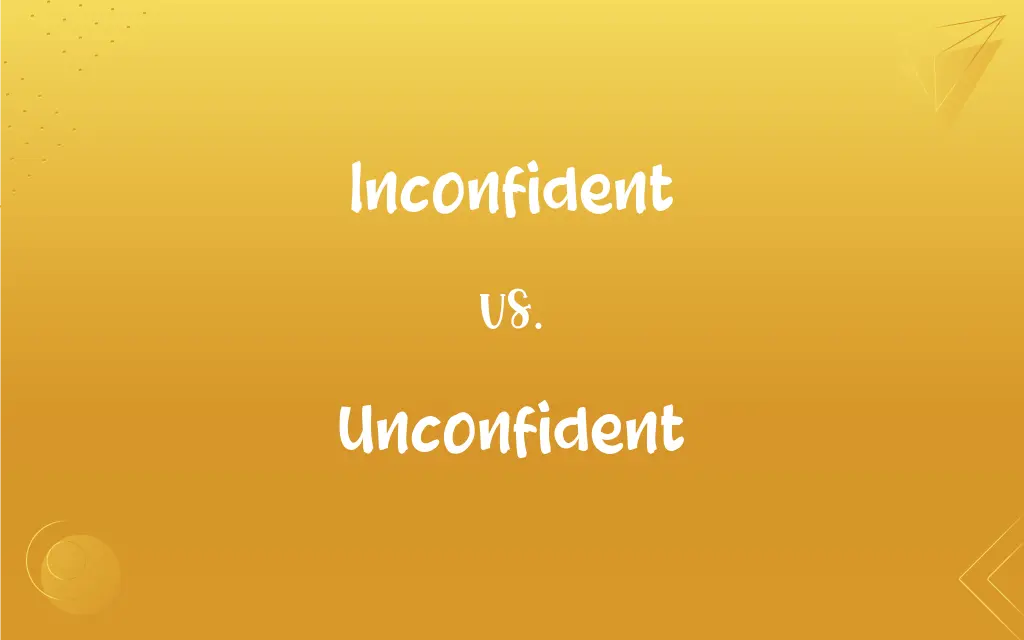Inconfident vs. Unconfident: What's the Difference?
By Janet White || Updated on May 21, 2024
"Inconfident" is a less common term implying a lack of confidence, while "unconfident" is more widely used to describe someone who lacks self-assurance.

Key Differences
"Inconfident" is a rarely used term that denotes a lack of confidence. It carries the same meaning as "unconfident," suggesting that someone is not confident or assured. Despite its rarity, it can be understood as describing a person who is insecure or unsure of themselves. "Unconfident," on the other hand, is the standard term used to express a lack of confidence. It is widely recognized and understood, making it the preferred choice in most contexts. When someone is described as unconfident, it implies they do not feel self-assured or capable.
While both terms share the same basic meaning, "unconfident" is the more commonly accepted and used term. "Inconfident" might be encountered in older texts or less formal speech, but "unconfident" is the term most people will understand without hesitation.
The rarity of "inconfident" means it could be seen as unusual or outdated, whereas "unconfident" is clear and straightforward, making communication more effective.
Comparison Chart
Meaning
Lacking confidence
Lacking confidence
Commonality
Rarely used
Commonly used
ADVERTISEMENT
Recognition
Less recognized
Widely recognized
Usage Context
Formal or older texts
General, everyday usage
Perceived Clarity
May seem unusual or outdated
Clear and straightforward
Inconfident and Unconfident Definitions
Inconfident
Not feeling confident.
She appeared inconfident during the interview.
Unconfident
Not self-assured.
He seemed unconfident in his abilities.
ADVERTISEMENT
Inconfident
Lacking self-assurance.
He felt inconfident about his presentation skills.
Unconfident
Lacking confidence.
She felt unconfident about the outcome.
Inconfident
Hesitant and lacking confidence.
He was inconfident about his decisions.
Unconfident
Feeling insecure.
The team was unconfident after the loss.
Inconfident
Insecure or unsure of oneself.
The student was inconfident when answering questions.
Unconfident
Unsure of oneself.
He appeared unconfident in front of the audience.
Inconfident
Showing signs of low confidence.
Her inconfident mannerisms were evident.
Unconfident
Displaying low confidence.
Her unconfident demeanor was noticeable.
Inconfident
(rare) unconfident; lacking confidence
Unconfident
Not confident.
Unconfident
Lacking or marked by a lack of confidence
FAQs
What does "unconfident" mean?
"Unconfident" means lacking confidence and is the more commonly used term.
Can "inconfident" be used in formal writing?
It can be used, but it might seem unusual or less familiar to readers.
What does "inconfident" mean?
"Inconfident" means lacking confidence, though it is a rarely used term.
Is "unconfident" recognized by most people?
Yes, "unconfident" is widely recognized and understood.
Does "inconfident" have a synonym?
Yes, a synonym could be "insecure."
Is "unconfident" commonly used?
Yes, "unconfident" is widely used and understood.
Can "unconfident" be used in formal writing?
Yes, "unconfident" is appropriate for formal writing.
Is "inconfident" commonly used?
No, "inconfident" is rarely used and might be seen as outdated.
Is "inconfident" recognized by most people?
No, many people may not recognize "inconfident" as readily as "unconfident."
Does "unconfident" have a synonym?
Yes, a synonym could be "insecure."
Which term is better for clear communication?
"Unconfident" is better for clear communication due to its common usage.
Is "inconfident" appropriate for academic writing?
It can be used, but "unconfident" might be a clearer choice.
Is there a regional preference for using "unconfident"?
No, "unconfident" is widely accepted in all English-speaking regions.
Is "unconfident" appropriate for academic writing?
Yes, "unconfident" is suitable for academic writing.
Can "inconfident" and "unconfident" be used interchangeably?
They can be, but "unconfident" is the preferred and more recognized term.
Is there a regional preference for using "inconfident"?
No, "inconfident" is rarely used in any English-speaking region.
Is "unconfident" used in modern English?
Yes, "unconfident" is commonly used in modern English.
Is "inconfident" used in modern English?
It is rarely used in modern English and might be considered outdated.
Does "inconfident" sound formal or informal?
"Inconfident" can sound formal but is outdated.
Does "unconfident" sound formal or informal?
"Unconfident" can be used in both formal and informal contexts.
About Author
Written by
Janet WhiteJanet White has been an esteemed writer and blogger for Difference Wiki. Holding a Master's degree in Science and Medical Journalism from the prestigious Boston University, she has consistently demonstrated her expertise and passion for her field. When she's not immersed in her work, Janet relishes her time exercising, delving into a good book, and cherishing moments with friends and family.
































































